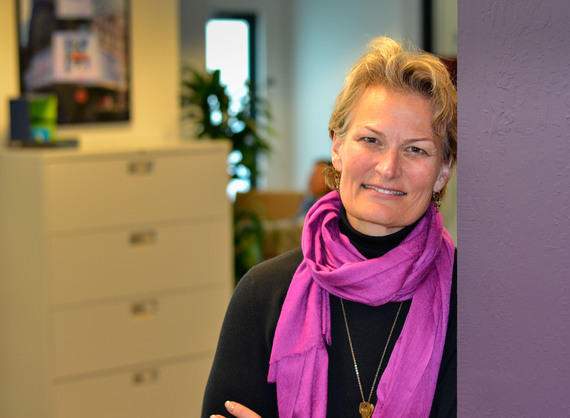By: Pat Christen, CEO and President at HopeLab
I recently watched Monica Lewinsky's TED Talk. I was riveted. The former White House Intern has stepped back into the public arena in order to reclaim her narrative and, as she said, "give a purpose to my past." She is using her experience as a cautionary tale about the consequences of the "blood sport" of public shaming. I found her talk to be quite courageous.
Like many who were around in 1998 when Ms. Lewinsky became a household name, I was inundated by the media coverage. What I remember are parallel narratives unfolding, with predictable Washington partisan accusations and counter-accusations on one side and a frenzy of personal and demeaning attacks on the other. Ms. Lewinsky took fire from all quarters. What I never heard - and what the TED Talk threw into stark relief for me - was Ms. Lewinsky's own point of view.
When Ms. Lewinsky's world was sent reeling, the immediate and widespread availability of information through the Internet and the 24-hour news cycle were still relatively new phenomena. The destruction of Ms. Lewinsky's reputation through the round-the-clock ubiquity of the news was unprecedented in its magnitude. "I was Patient Zero of losing a personal reputation on a global scale almost instantaneously," she told her TED Talk audience.
Beyond the caricature
In 1998, Ms. Lewinsky was 22 years old.
It was both astonishing and refreshing to hear the bright, self-reflective, and courageous voice of Ms. Lewinsky, now 41, filling in the void that has so long hobbled our understanding of the entire incident - including a deeper understanding of ourselves. She didn't provide any missing facts about what happened in 1998 - and I think that's a good thing; that was not the point of her talk. Instead, she simply showed us that the two-dimensional beret-wearing caricature we had been given of "that woman" was woefully inadequate. In the frenzied rush to report on the affair, just about everyone forgot that Ms. Lewinsky herself drew breath, felt pain, and - like all 22-year-olds - made mistakes. Watching Ms. Lewinsky tell her story and morph from caricature into a living, thinking, feeling, multi-dimensional human being reminded me of how horribly and collectively we failed her. And, now, as a mother of two daughters, I try to imagine what I would do were one of my children caught up in such a nightmare. I'm humbled and horrified by the suffering inflicted on Ms. Lewinsky and her family. Though I do not remember any specific remarks on my part at the time, I'm certain I must have participated in thoughtless speech associated with these events and now deeply regret that I too may have added to that tsunami.
I'm sure many people will point out that by having an affair with a married man the failure was Ms. Lewinsky's. I believe Ms. Lewinsky has now been held accountable for her acts. But what of the rest of us? What of the lack of care and compassion we took in understanding her, once she came to our attention? What of the limited and derisive vocabulary we utilized in pursuit of that understanding and our individual and collective unwillingness to deepen the conversation? What of our lack of reflection and humility regarding our own behavior, flaws and mistakes at 22? Perhaps most profoundly, what of our gratefulness at being forgiven for our own errors in stark contrast to our unwillingness to forgive her? Personally, I feel I failed her miserably.
Empathy and accountability
For my part, I would like to extend an apology to Ms. Lewinsky and her family. Not because her behavior was excusable or justified, but because it was all too human, and I dehumanized her at the time in my consumption of the story.
This dehumanization, most especially in the form of mindless and reactive speech, is of increasing concern to me in the digital, remote and anonymous environments we frequent. Thanks to a host of incremental and profound changes in the ways we live our lives and the communications tools that enable us, we have diminished our understanding of the consequences of our behavior on the lives of the people we encounter. This reduction in empathy accompanies a reduction in accountability. We are drive-by critics. We make our point, lob our grenades and drive on. Our actions may make us feel self-satisfied, may even garner us "likes" or re-tweets, but do they actually improve insight or understanding into the situation at hand? It is a question to consider before hitting the send button.
That was the power of Ms. Lewinsky's TED Talk for me. Few of us remember the off-handed remarks we made (myself included). Yet, nearly two decades later, Ms. Lewinsky can map in painful detail the shattered landscape of her life, where the mob mentality of the coverage--"public shaming as blood sport," in her words--obliterated the future she had before her. My heart broke as she described her mother's insistence that Ms. Lewinsky leave the bathroom door open when she showered, fearful that she might harm herself, that she would be "humiliated to death." Her courage in giving us a glimpse of this carnage, reminding us that she is a person, was a profoundly humanizing action. I'm so grateful to her for the bravery she showed, the insights she offered and the lessons she taught me.
There is a beautiful quote by Sri Ali Baba that I pulled out after watching Ms. Lewinsky's talk again last night. It reads:
"Before you speak, ask yourself: Is it kind, is it
necessary, is it true, does it improve upon the silence?"
I'm confident any remarks I offered on Ms. Lewinsky's situation in 1998 were likely unnecessary. I'm equally confident Ms. Lewinsky's TED Talk was a remarkable improvement on the silence.
